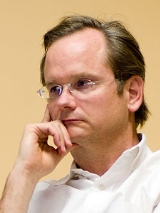
academic
and political activist. He is best known as a proponent of reduced legal restrictions on copyright
, trademark
, and radio frequency spectrum
, particularly in technology applications, and he has called for state-based activism to promote substantive reform of government with a Second Constitutional Convention
.
He is a director of the Edmond J. Safra Foundation Center for Ethics at Harvard University
and a professor of law at Harvard Law School
.
When government disappears, it's not as if paradise will take its place. When governments are gone, other interests will take their place.![]()
We are on the cusp of this time where I can say, "I speak as a citizen of the world" without others saying, "God, what a nut." ![]()
You can't incent a dead person. No matter what we do, Nathaniel Hawthorne|Hawthorne will not produce any more works, no matter how much we pay him.![]()
We live in a world with "free" content, and this freedom is not an imperfection. We listen to the radio without paying for the songs we hear; we hear friends humming tunes that they have not licensed. We tell jokes that reference movie plots without the permission of the directors. We read our children books, borrowed from a library, without paying the original copyright holder for the performance rights.
![]()
In arguing for increasing content owners' control over content users, it's not sufficient to say "They didn't pay for this use."
![]()
Creation always involves building upon something else. There is no art that doesn't reuse. And there will be less art if every reuse is taxed by the appropriator. Monopoly controls have been the exception in free societies; they have been the rule in closed societies.
![]()

